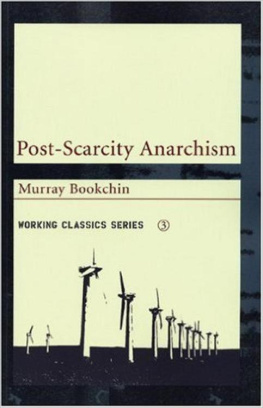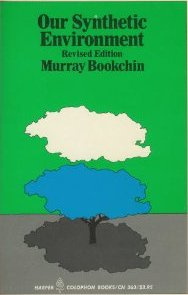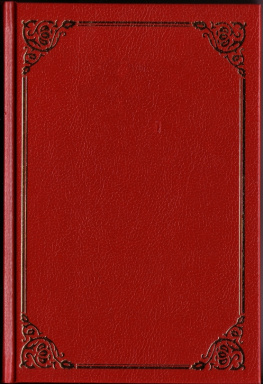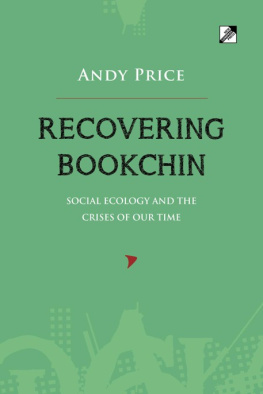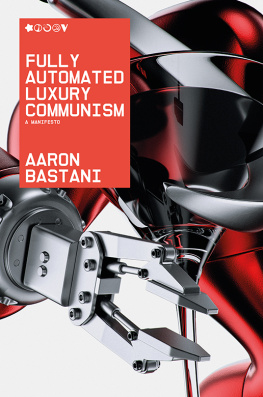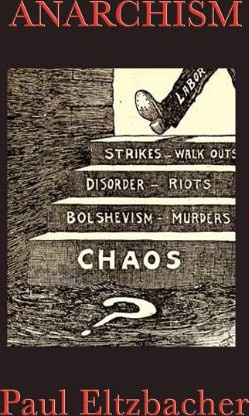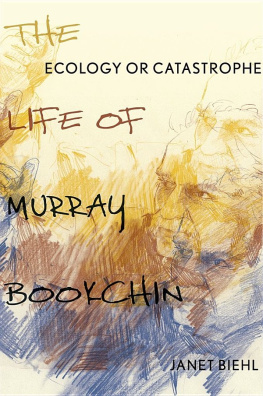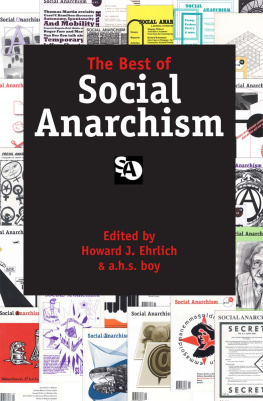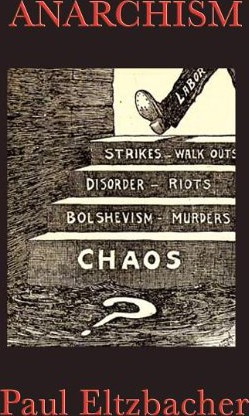Murray Bookchin - Post-Scarcity Anarchism
Here you can read online Murray Bookchin - Post-Scarcity Anarchism full text of the book (entire story) in english for free. Download pdf and epub, get meaning, cover and reviews about this ebook. year: 2004, publisher: AK Press, genre: Politics. Description of the work, (preface) as well as reviews are available. Best literature library LitArk.com created for fans of good reading and offers a wide selection of genres:
Romance novel
Science fiction
Adventure
Detective
Science
History
Home and family
Prose
Art
Politics
Computer
Non-fiction
Religion
Business
Children
Humor
Choose a favorite category and find really read worthwhile books. Enjoy immersion in the world of imagination, feel the emotions of the characters or learn something new for yourself, make an fascinating discovery.
- Book:Post-Scarcity Anarchism
- Author:
- Publisher:AK Press
- Genre:
- Year:2004
- Rating:3 / 5
- Favourites:Add to favourites
- Your mark:
- 60
- 1
- 2
- 3
- 4
- 5
Post-Scarcity Anarchism: summary, description and annotation
We offer to read an annotation, description, summary or preface (depends on what the author of the book "Post-Scarcity Anarchism" wrote himself). If you haven't found the necessary information about the book — write in the comments, we will try to find it.
Post-Scarcity Anarchism — read online for free the complete book (whole text) full work
Below is the text of the book, divided by pages. System saving the place of the last page read, allows you to conveniently read the book "Post-Scarcity Anarchism" online for free, without having to search again every time where you left off. Put a bookmark, and you can go to the page where you finished reading at any time.
Font size:
Interval:
Bookmark:
 Books by Murray Bookchin
Books by Murray Bookchin The Modern Crisis (1986)
The Ecology of Freedom (1982)Toward an Ecological Society (1980)The Spanish Anarchists (1976)The Limits of the City (1973)Post-Scarcity Anarchism (1971)Crisis in Our Cities (1965)
Our Synthetic Environment (1962)
Anarchism
BLACKROSE
BOOKS
No part of this book may be reproduced or transmitted in any form by means,To theelectronic or mechanical, including photocopying and recording, or by anymemory ofinformation storage or retrieval system, without written permission from the
author or publisher, except for brief passages quoted by a reviewer in a Josef Weber newspaper or magazine. and
Black Rose Books No. 0 71Allan HoffmanISBN Hardcover 0-920057-41-1
ISBN Paperback 0-920057-39-X
Bookchin, Murray, 1921-
Post-scarcity anarchism
2nd rev. ed.
Bibliography: p.
ISBN 0-920057-41-1 (bound). ISBN 0-920057-39-X (pbk.).
I . AnarchismAddresses, essays, lectures. 2. RadicalismAddresses, essays, lectures. 3. EcologyAddresses, essays, lectures.I. Title.
HX833.B66 1986335'.83C86-090135-1Cover design: J.W. StewartBlack Rose Books
3981 boul. St. Laurent
Montreal, Que. H2W 1Y5
Canada
33 East Tupper St.Buffalo, N.Y. 14230USA
We normally live completely immersed in the presenttosuch a degree, in fact, that we often fail to see how muchour own social period differs from the pastindeed from amere generation ago. This captivity to the contemporarycan be very insidious. It may shackle us unknowingly tothe most reactionary aspects of tradition, be they obsoletevalues and ideologies, hierarchical forms of organization,or one-sided modes of political behavior. Unless our rootsin contemporary life are broadened by a rich perspective,they may easily distort our understanding of the world asit really is, as well as its rich potentialities for the future.
For the world is changing profoundly, more profoundlythan many of us seem to recognize. Until very recently,human society developed around the brute issues posed byunavoidable material scarcity and their subjective counterpart in denial, renunciation and guilt. The great historicsplits that destroyed early organic societies, dividing manfrom nature and man from man, had their origins in theproblems of survival, in problems that involved the meremaintenance of human existence.* Material scarcity provided the historic rationale for the development of thepatriarchal family, private property, class domination andthe state; it nourished the great divisions in hierarchicalsociety that pitted town against country, mind against sensuousness, work against play, individual against society,and, finally, the individual against himself.
* By "organic societies" I mean forms of organization in which thecommunity is united by kinship ties and by common interests indealing with the means of life. Organic societies are not yet dividedinto the classes and bureaucracies based on exploitation that we findin hierarchical society.
Whether this long and tortuous development could havefollowed a different, more benign, course is now irrelevant.The development is largely behind us. Perhaps like themythic apple, which, once bitten, had to be consumedcompletely, hierarchical society had to complete its ownbloody journey before its demonic institutions could beexorcised. Be that as it may, our position in that historicdrama differs fundamentally from that of anyone in thepast. We of the twentieth century are literally the heirs ofhuman history, the legatees of man's age-old effort to freehimself from drudgery and material insecurity. For thefirst time in the long succession of centuries, this centuryand this one alonehas elevated mankind to an entirely new level of technological achievement and to anentirely new vision of the human experience.
We of this century have finally opened the prospect ofmaterial abundance for all to enjoya sufficiency in themeans of life without the need for grinding, day-to-daytoil. We have discovered resources, both for man and industry, that were totally unknown a generation ago. Wehave devised machines that automatically make machines.We have perfected devices that can execute onerous tasksmore effectively than the strongest human muscles, thatcan surpass the industrial skills of the deftest humanhands, that can calculate with greater rapidity and precision than the most gifted human minds. Supported by thisqualitatively new technology, we can begin to providefood, shelter, garments, and a broad spectrum of luxurieswithout devouring the precious time of humanity andwithout dissipating its invaluable reservoir of creative energy in mindless labor. In short, for the first time in history we stand on the threshold of a post-scarcity society.
The word "threshold" should be emphasized here for inno way has the existing society realized the post-scarcitypotential of its technology. Neither the material "privileges" that modern capitalism seems to afford the middleclasses nor its lavish wasting of resources reflects therational, humanistic, indeed unalienated, content of apost-scarcity society. To view the word "post-scarcity"simply as meaning a large quantity of socially availablegoods would be as absurd as to regard a living organismsimply as a large quantity of chemicals.* For one thing,scarcity is more than a condition of scarce resources: theword, if it is to mean anything in human terms, mustencompass the social relations and cultural apparatus thatfoster insecurity in the psyche. In organic societies thisinsecurity may be a function of the oppressive limits established by a precarious natural world; in a hierarchical society it is a function of the repressive limits established byan exploitative class structure. By the same token, theword "post-scarcity" means fundamentally more than amere abundance of the means of life: it decidedly includesthe kind of life these means support. The human relationships and psyche of the individual in a post-scarcity societymust fully reflect the freedom, security and self-expressionthat this abundance makes possible. Post-scarcity society,in short, is the fulfillment of the social and cultural potentialities latent in a technology of abundance.
Capitalism, far from affording "privileges" to the middleclasses, tends to degrade them more abjectly than anyother stratum in society. The system deploys its capacityfor abundance to bring the petty bourgeois into complicitywith his own oppressionfirst by turning him into a commodity, into an object for sale in the marketplace; next byassimilating his very wants to the commodity nexus.Tyrannized as he is by every vicissitude of bourgeois soci
* Hence the absurdity of Tom Hayden's use of the expression"post-scarcity" in his recent book, The Trial. Hayden ' s fear that theyouth culture might slip into "post-scarcity hedonism" and becomesocially passive suggests that he has yet to understand fully themeaning of "post-scarcity" and the nature of the youth culture.
Next pageFont size:
Interval:
Bookmark:
Similar books «Post-Scarcity Anarchism»
Look at similar books to Post-Scarcity Anarchism. We have selected literature similar in name and meaning in the hope of providing readers with more options to find new, interesting, not yet read works.
Discussion, reviews of the book Post-Scarcity Anarchism and just readers' own opinions. Leave your comments, write what you think about the work, its meaning or the main characters. Specify what exactly you liked and what you didn't like, and why you think so.

